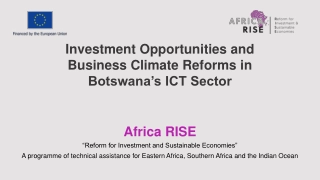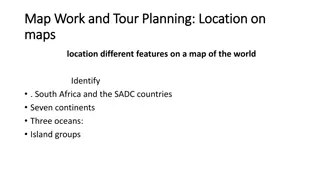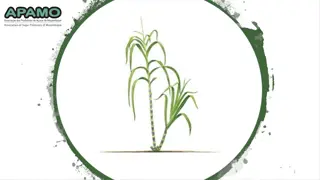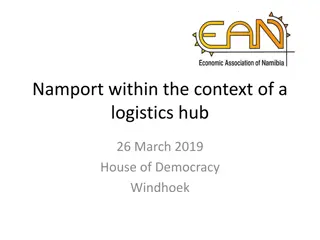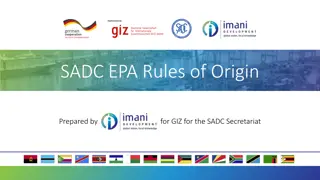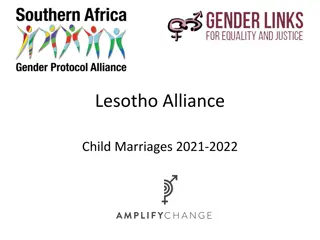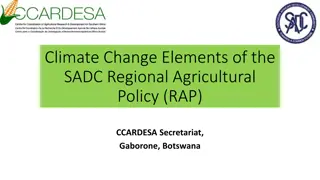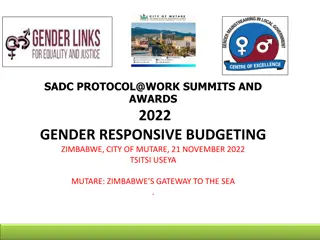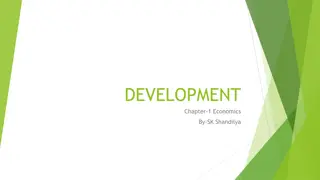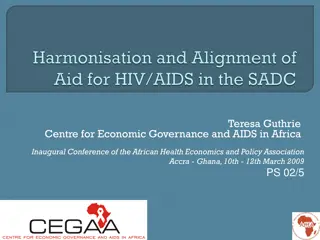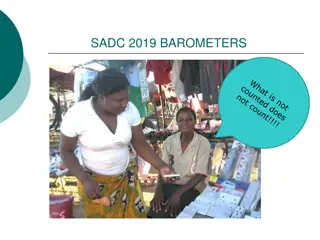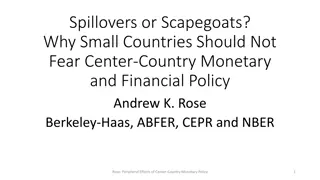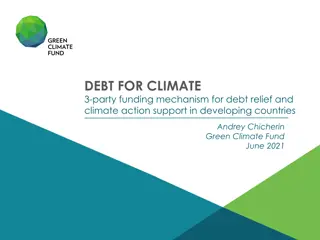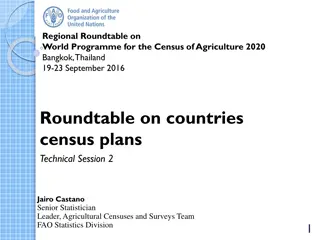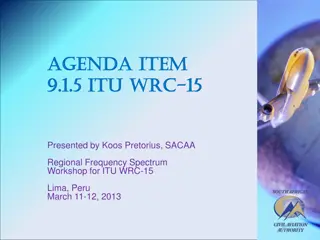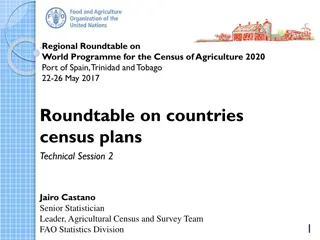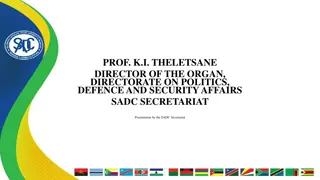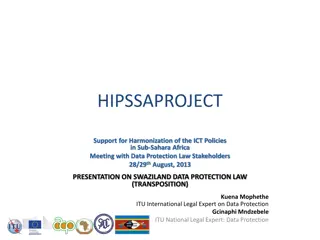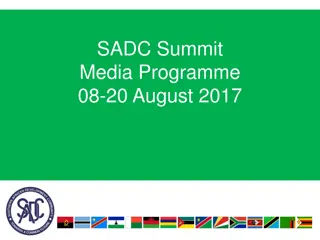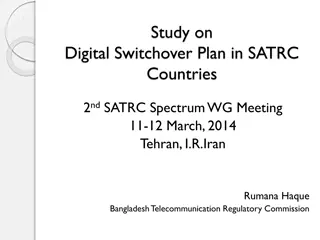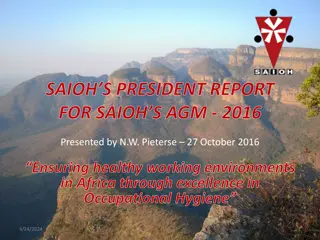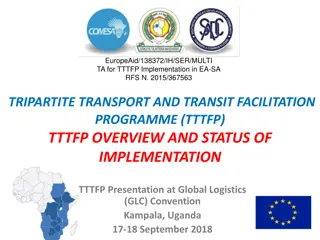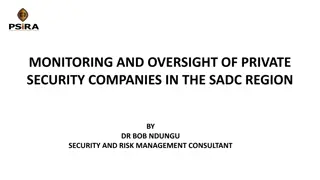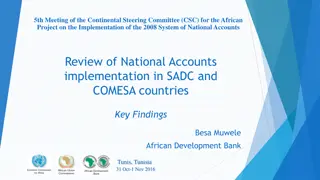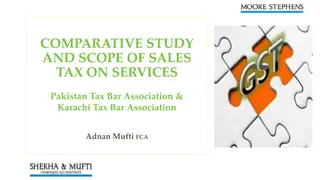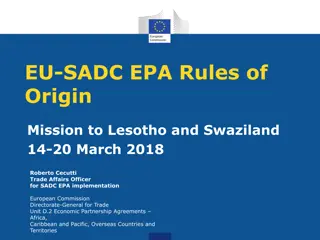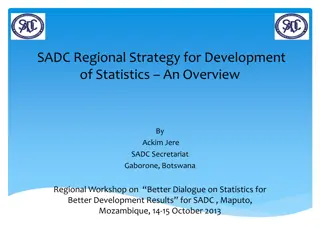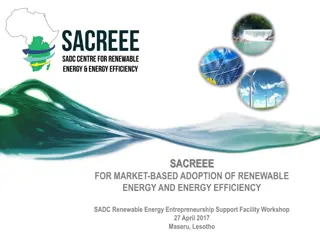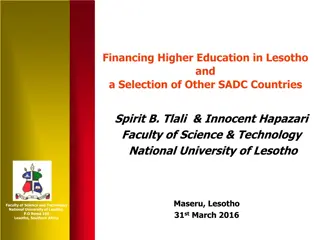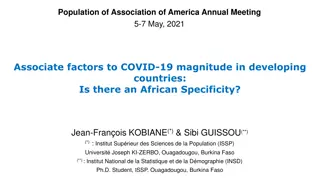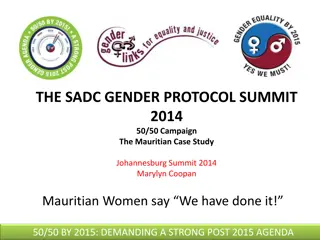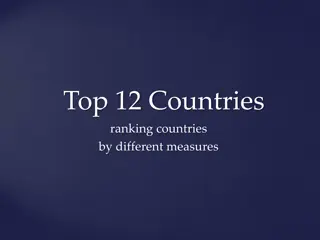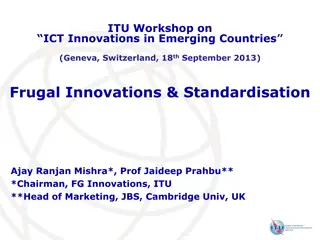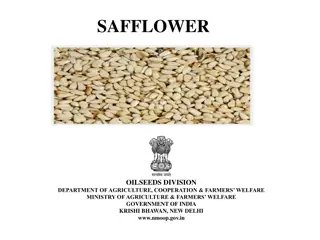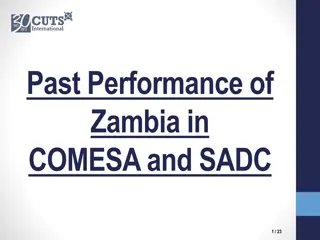Investment Opportunities in Botswana's ICT Sector: A Comprehensive Assessment
Building a vibrant ICT sector in Botswana requires strategic foresight and tactical implementation. Despite some advancements, the sector faces challenges like infrastructure gaps and limited talent pool hindering significant foreign direct investment. Benchmarking against SADC countries reveals are
0 views • 19 slides
Geospatial Comparison of Economic Change and Climate Disasters in Asia-Pacific
This study explores the impact of natural disasters on economic indicators in Southern and Western Asian countries over time, aiming to assist in policy-making by understanding the relationship between natural disasters and the economy. It discusses the increasing incidences of extreme weather event
4 views • 18 slides
Physician Satisfaction Levels in High-Income Countries
Primary care physicians' satisfaction with their medical practices, income, quality of care, and time spent with patients varies across high-income countries. Sweden, France, and Switzerland stand out for higher overall satisfaction levels, while concerns over quality of care since the COVID-19 pand
4 views • 7 slides
Explore Map Work, Tour Planning, and Geographical Features Worldwide
Discover the location of South Africa, the SADC countries, continents, oceans, and island groups on a world map. Learn about the Southern African Development Community (SADC) and the seven continents. Understand the tourism regions and island groups found in various parts of the world. Enhance your
0 views • 9 slides
Enhancing Nutritional Security in SADC Communities through Sugar Fortification
Nutritional security is crucial for overall well-being, and this presentation explores the significant role of sugar fortification in improving micronutrient intake and combating malnutrition in SADC regions. Insights into the current status quo, strategies for enhancing micronutrient intake, and th
0 views • 15 slides
Challenges Faced by Namport as a Logistics Hub in Windhoek
Namport, a crucial link in the logistics hub in Windhoek, faces challenges such as declining vessel visits, decreasing competitiveness, and unrealistic investment assumptions impacting cargo handling and transshipment. The data indicates a need for strategic improvements to enhance its position as a
4 views • 11 slides
Technical Soundness of EU-SADC EPA Rules of Origin
The implementation and technical soundness of Rules of Origin under the EU-SADC EPA are crucial for the utilization of trade preferences. Compliance with rules of origin is essential for receiving tariff preferences, but drafting these rules accurately is challenging. Recommendations include specify
4 views • 12 slides
Addressing Child Marriages in Lesotho: Analysis, Frameworks, and Laws
This report delves into the issue of child marriages in Lesotho, covering situation analysis, key facts, normative frameworks, and laws in the country. It addresses the minimum legal age of consent to marriage, societal attitudes, and relevant international treaties. The current situation in Lesotho
4 views • 12 slides
Climate Change Elements of the SADC Regional Agricultural Policy
Agriculture is central to poverty reduction in the SADC region, with a significant impact on livelihoods and GDP. The Regional Agricultural Policy (RAP) aims to promote sustainable agricultural growth and socio-economic development through specific objectives like enhancing productivity, improving t
1 views • 13 slides
The Future of Sugar Industry in SADC Region
The presentation at FSSP Conference 2019 highlighted the significance of the sugar industry in supporting economic development, employment creation, and poverty reduction in the SADC region. The industry plays a crucial role in driving industrialization, providing revenue and skills, and satisfying
1 views • 23 slides
Gender-Responsive Budgeting in Zimbabwe: A Case Study of Mutare City Council
The City of Mutare in Zimbabwe is implementing gender-responsive budgeting as per the SADC Protocol on Gender and Development. The council has a gender policy ensuring inclusivity in budgeting, guided by national policies and frameworks. Stakeholders, including women, youth, and people with disabili
0 views • 19 slides
Overview of Development Economics and Goals
Development economics is a branch of economics that focuses on improving the economies of developing countries by targeting factors such as health, education, working conditions, and policies. It involves macroeconomic and microeconomic analysis to enhance domestic and international growth. Differen
1 views • 11 slides
Progress and Challenges in Harmonising HIV/AIDS Funds in SADC Region
Incidence of HIV/AIDS in the SADC region has been steadily increasing, with 15 million HIV-positive individuals. Member states have implemented measures at national and regional levels, including multi-sectoral plans and commitments to various frameworks and declarations. Efforts have been made towa
1 views • 32 slides
Global Economic Update: High-income Economies Accelerating, Developing Countries Facing Challenges
The global economic outlook presents a contrast between high-income economies accelerating in growth while developing countries encounter challenges due to headwinds and capacity constraints. Key messages highlight the need for structural reforms to enhance outcomes. Risks include fallout from the s
4 views • 34 slides
SADC 2019 Barometer Report Insights
The SADC 2019 Barometer Report highlights key findings on Sexual and Reproductive Health, Governance, Human Rights, Gender Equality, and more in Southern Africa. It explores country performances, sector scores, and comparative analysis, shedding light on progress and challenges in the region.
0 views • 15 slides
Small Countries' Resilience Against Center-Country Monetary Policies
Small countries should not fear the monetary and financial policies of larger center countries. This article discusses the potential spillovers of unconventional monetary policies by center countries, such as quantitative easing and negative nominal interest rates. It explores the concept of currenc
0 views • 39 slides
Three-Party Funding Mechanism for Debt Relief and Climate Action Support in Developing Countries
Developing countries require significant financial support to address climate vulnerabilities, surpassing current commitments from developed nations. A suggested three-party funding mechanism aims to facilitate ongoing funding for climate projects while providing debt relief to vulnerable countries,
0 views • 11 slides
Overview of Agricultural Census Participation in Asian Countries
This text highlights the participation of Asian countries in agricultural censuses during the World Programme for the Census of Agriculture (WCA) rounds in 2010 and planned for 2020. It provides insights into the countries that conducted agricultural censuses, their respective plans for the upcoming
0 views • 14 slides
Enhancing Aviation Safety with Advanced Communication Networks in Africa
Aviation safety in Africa has been improved through the implementation of advanced communication networks like the SADC/1 and NAFISAT. These networks have replaced outdated infrastructure, allowing for reliable Air Traffic Services and data transmission. The initiative led by ATNS and IATA has signi
0 views • 15 slides
Regional Roundtable on World Programme for the Census of Agriculture 2020
The Regional Roundtable held in Port of Spain, Trinidad and Tobago in May 2017 focused on countries' census plans for the World Programme for the Census of Agriculture. The event discussed participation statistics, census rounds, and the status of FAO Caribbean countries in conducting agricultural c
0 views • 13 slides
Enhancing Democratic Electoral Processes in Africa: Challenges and Solutions
Democratic electoral processes in Africa must strive to be inclusive, transparent, and accountable to promote public confidence. The importance of independent and professional electoral governance institutions is emphasized to address the legitimacy crisis facing elections today. The SADC Secretaria
0 views • 13 slides
Overview of Data Protection Law Transposition in Swaziland
Presentation on the transposition of data protection law in Swaziland, discussing the background, national assessment, purpose of the law, objectives of the SADC model law, and the approach to drafting the Data Protection Bill. This includes establishing a Data Protection Authority, harmonizing appr
0 views • 21 slides
SADC Summit Media Programme: August 2017 Schedule
The SADC Summit Media Programme outlines the events scheduled from 08-20 August 2017, including briefings by SADC officials, ministerial meetings, and the official opening of the Council of Ministers meeting. The programme covers various topics such as infrastructure, finance, social development, an
0 views • 9 slides
Overview of Digital Switchover Plan in SATRC Countries
The study discusses the importance and necessity of Digital Switchover (DSO) in SATRC countries, highlighting the transition from analogue to digital TV and radio. It covers the global trends in digital broadcasting standards, the status of DSO in various countries like India, and the need for harmo
0 views • 16 slides
Ensuring Healthy Working Environments in Africa through Excellence in Occupational Hygiene - SAIOH President Report for SAIOH S.AGM. 2016
Synopsis of the SAIOH President's report presented at the SAIOH S.AGM. 2016 by N.W. Pieterse focuses on the current state of Occupational Hygiene in Southern Africa, challenges faced, achievements, and the way forward. It discusses the need for more occupational hygienists in South Africa and SADC c
0 views • 25 slides
Tripartite Transport and Transit Facilitation Programme Overview
The Tripartite Transport and Transit Facilitation Programme (TTTFP) aims to enhance the regional road transport market in the COMESA-EAC-SADC Tripartite region by developing harmonized policies and standards. The program, funded by the EU, involves 21 mainland Member States and focuses on improving
0 views • 21 slides
Challenges in Monitoring and Oversight of Private Security Companies in the SADC Region
The article discusses the importance of monitoring private security companies in the SADC region, highlighting challenges in oversight, legislative gaps, vague definitions of permitted activities, and issues with monitoring and regulatory authorities. It emphasizes the need for better frameworks to
0 views • 19 slides
Review of National Accounts Implementation in African Countries - Key Findings
Review of the implementation of the 2008 System of National Accounts in SADC and COMESA countries was conducted at the 5th Meeting of the Continental Steering Committee. The assessment covered various aspects such as methodology, staffing, and recommendations. Key findings from the evaluation were p
0 views • 20 slides
Enhancing Civil Society Engagement in SADC Region
Exploring the State of Play for SADC's Engagement with Non-State Actors (NSAs) during the ACP-EU Seminar in Windhoek. The presentation highlights the importance of strengthening partnerships with civil society organizations to influence policy agendas for regional development.
0 views • 23 slides
Comparative Study of Sales Tax on Services in Various Countries
This content provides information on the scope and implementation of sales tax on services in different countries like Pakistan, India, Australia, Canada, France, Japan, and Malaysia. It highlights the VAT/GST regimes across the globe, the number of countries implementing VAT/GST by region, and coun
0 views • 55 slides
Understanding Rules of Origin in Trade Agreements
Rules of origin play a crucial role in determining the national source of a product, certifying its origin, and securing preferential treatment under trade agreements. This includes defining where goods are produced and how they are made, with specific criteria for each case. Preferential rules of o
0 views • 15 slides
SADC Regional Strategy for Development of Statistics
The SADC Regional Strategy for Development of Statistics aims to address outdated statistical strategies, align with the SADC Regional Indicative Strategic Development Plan, and meet the increasing demand for harmonized regional statistical data. The strategy development process involved collaborati
0 views • 19 slides
Supporting Renewable Energy Entrepreneurs in the SADC Region
This workshop in Maseru, Lesotho, aims to address barriers faced by renewable energy entrepreneurs in the SADC region, such as lack of funding and business skills. The facility will provide mentorship, refine proposals for funding, and create linkages with financial institutions. Key issues to be ta
0 views • 5 slides
Financing Higher Education in Lesotho and SADC Countries
Higher education plays a crucial role in nation-building and economic development, contributing to human capital formation, knowledge dissemination, and sustainable growth. This presentation explores the importance of financial stability and investment in higher education institutions in Lesotho and
0 views • 23 slides
Factors Influencing COVID-19 Magnitude in Developing Countries: African Specificity
An exploration of factors influencing the magnitude of COVID-19 in developing countries, with a focus on any African specificity. The study uses diverse data from various developing countries to investigate the impact of demographic, economic, social service access, environmental, climatic, and heal
0 views • 16 slides
Women Empowerment Through Political Representation: The Mauritian Case Study
In the Mauritian context, the 50/50 Campaign aimed to achieve equal representation of women in politics by 2015. Through constitutional amendments and gender-neutral quotas, Mauritius saw a significant increase in women's participation in local government, moving from 14th to 6th rank among SADC cou
0 views • 28 slides
Exploring the Top 12 Countries by Size, Population, and Economy
Unveil the top 12 largest countries in the world based on various measures like size, population, and economy. Discover why some large countries are not among the most populous or economically strong. Delve into the relationship between wealth, size, and population in these countries.
0 views • 9 slides
Impact of Standardization on Economic Growth in Emerging Countries
Standardization plays a crucial role in the economic growth of emerging countries by contributing significantly to GDP growth and labor productivity. Case studies from countries like Germany, UK, Canada, and Australia highlight the positive impact of standards on innovation and overall economic perf
0 views • 8 slides
Safflower: Overview of Cultivation, Climate, and Global Scenario
Safflower, scientifically known as Carthamus tinctorius L., is a versatile oilseed crop cultivated in various countries. The plant is characterized by its thistle-like appearance, branching structure, and cross-pollination nature. Safflower is adaptable to different climates, preferring drier areas
0 views • 29 slides
Past Performance of Zambia in COMESA and SADC
Zambia's trade involvement in COMESA and SADC regions, including its export and import partners, trade overview within COMESA, and the impact of regional integration on the country's economy. The content discusses the successes, challenges, and historical background of regional integration in Africa
0 views • 24 slides
